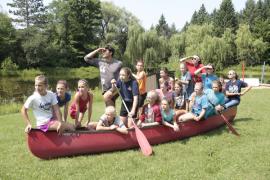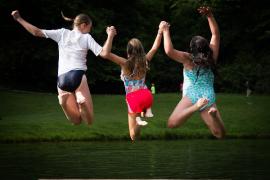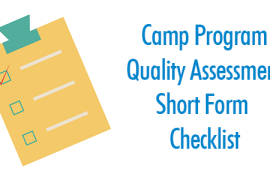Hi everyone,
As many of you are aware, last week was ACA’s annual National Conference at Disney’s Coronado Springs Resort in Lake Buena Vista, Florida. With amazing weather, fantastic people, and super informative sessions, it was an incredible conference for both practitioners, researchers, and everyone in between! I thought I’d take this opportunity to share with you three research-related takeaways from the conference.
1. Research in camp settings isn’t that hard.
On Tuesday afternoon, I went to a fantastic session by Mary Rogers (of Sherwood Forest Camp and ACA’s Committee for the Advancement of Research and Evaluation) and Deb Bialeschki (senior researcher at ACA). The 75-minute session, titled “Measuring Outcomes 101: Easy Steps for Beginners” flew by as Mary and Deb explained why some people are hesitant to incorporate research into their organization, easy ways to take the first step into research, and how research can benefit youth, parents, and camps alike. As practitioners, many people are facing similar challenges, such as a lack of resources to collect data (both time and people), questions about how to analyze it and get the findings out to stakeholders, as well as a general apprehension about how to bridge the gap between research and camp. For those of you who are thinking about trying to incorporate research into your programs, it’s important to have a plan. Here are some helpful tips to consider:
- Know what you want to measure — what type of camper outcomes are you looking for? What tool will you use? For example which of the Youth Outcomes Battery (YOB) scales will be most beneficial for you? Or will you choose to use another measurement tool that’s available?
- Think about how you will use the results — which stakeholders will be receiving the information? Parents, funders, campers? Or is it for you internally to improve your programming? Will this shape what outcomes you’re investigating or what type of information you’re looking for?
- Consider the resources you will need — is this a physical paper and pencil survey for your campers or will it be done online? Which staff members will assist in this process? Do you want to partner up with a local college or university to see if they have any graduate students interested in helping out with the project?
- Think of the specifics about getting it done — when and where will it happen? Are you going to be involved personally, or will you need to train a staff member to do this? Will it occur during rest period in the dining hall with the head counselor or in camper cabins with individual counselors administering paper and pencil surveys?
- Decide what the next steps are — how will you use this information? If, for example, you find that campers haven’t rated their friendship skills as high as you would have liked, will it impact what you include in your staff training for next summer? If you find that campers value the opportunity to try new things at your camp, is this something you can post for parents on your camp’s Facebook page?
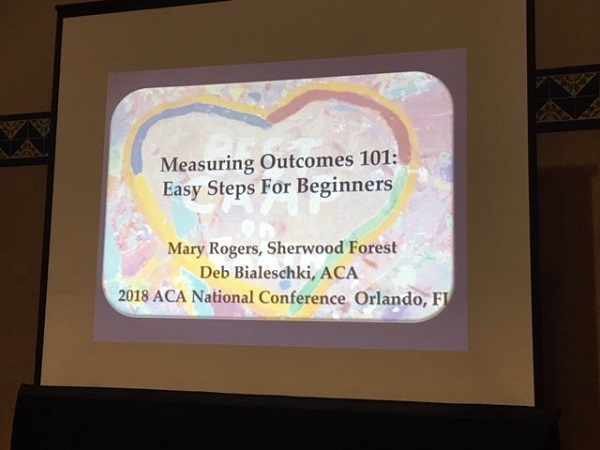
2. There’s a lot of research going on all over the country.
Every year, the ACA National Conference includes research sessions. These are short academic like presentations that highlight studies in the camp context. The presenters include everyone from graduate students, to college and university professors, to camp professionals who have implemented research into their programming. Typically, presentations are 15 minutes long with five minutes of questions from the audience at the end, followed by a period of Q & A for all the presenters within a given session. This year’s presentations included topics such as CIT and LIT programs, outcomes of online training for staff, girls’ experience of resiliency in camp, and programs for youth with chronic illness. The presentations were captivating and thought-provoking for many (myself included!) and prompted some fantastic discussions among camp professionals and academics.
Remember from this post that abstracts are short summaries of the research detailing the topic, previous work that has been done in the field and subject area, the methods of the study, some interesting results, as well as how research and practice can move forward with this newfound information. If you missed any of the presentations this year, or simply want to learn more about what was discussed during the research sessions, check out the abstracts from all the research symposiums since 2012. Make sure to check them out, and if you have any questions, feel free to get in touch with the authors listed. They are always happy to explain their work in more detail!
In addition, every year ACA presents the Marge Scanlin Award for student research. This year’s recipient was Joey LaLiberte from Middlebury College. Joey worked with Dr. Chris Thurber to investigate boys’ perceptions of toughness, expressions of weakness, and conceptualizations of masculinity while at residential summer camp. More information about his research can be found in the 2018 Book of Research Abstracts.
Following the day of research presentations is the poster session. This year the ACA received an incredible number of submissions for the oral presentations, so several researchers were given the opportunity to instead present their work at the poster session. The poster session is an excellent time for researchers to interact with camp professionals and practitioners in a more casual and conversational environment. If you’re interested in partnering with local colleges and universities, this is a fantastic time to begin making those connections. Thanks to everyone who came to the exhibitor’s hall and stopped by the research posters!
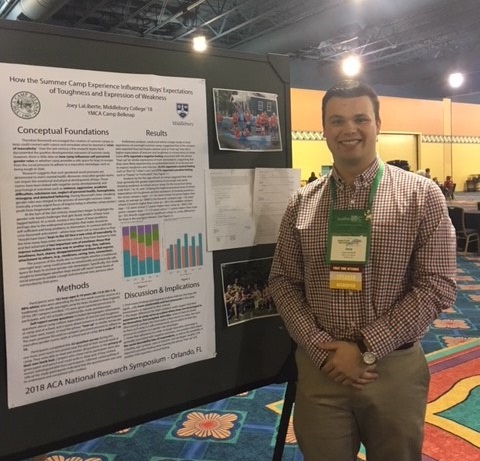
3. What camp professionals are looking for in research is coming!
Thursday morning, I attended a session specifically to assist camp directors in reading and using research in their programs, titled “Research You Can Use: New Findings, New Possibilities for Your Camp.” Drs. Cass Morgan and Laurie Browne did a great job of not only showing the participants how to read research abstracts, but also prompted participants to consider the ways in which findings from research can be used to show stakeholders (funders, parents, and campers themselves) the benefit of camp programs for all children. The presenters gave examples of research abstracts, how to identify the strengths and weakness in research, and how to understand if research is reliable. Mary Rogers also shared her experience of her camp, Sherwood Forest, incorporating research into their work and the associated benefits such as securing funds and improving their programming.
My favorite part of the session was when attendees were asked what they’re looking for in research. Some of the key responses were from participants who wanted to reiterate what they already know: camp is a great experience for youth as they grow and develop in so many different ways while immersed in the programs, these programs have long term effects on campers, and the choice to go to camp is a family decision, impacted by a variety of factors.
This is fantastic news! ACA will be investigating all of these different aspects in the Impact Study within the next few years. Not only does the study plan to explore the different outcomes associated with a camp experience for campers as well as staff, but there are plans to see how these skills transfer to different contexts, such as college and career, and what their long-term impact is on campers’ lives. Finally, as camp professionals we know that enrolling a child in camp is a huge decision, and we often feel privileged that families decide to send their child(ren) to our programs. But the question remains: why and how do families decide to do this? ACA and the research team at the University of Utah will be exploring this and many more questions in the upcoming years. Importantly, all of the findings from this work will be accessible to you, camp pros, because It is essential that use this data to inform your stakeholders of the benefit and power of the camp experience. Remember, as Dr. Laurie Browne said, research is only as good as its use, so let’s put it to use.
The National Conference reinforced that it is an exciting time to be in the industry. With research becoming more central in what we do, we can have a greater positive impact on campers and their families. Thank you yet again for joining me to see not only where we are in camp research, but where we’re going and how you can become a part of this journey too!
See you next time!
Victoria Povilaitis, a research assistant for ACA, is a doctoral student at the University of Utah and has worked in the camp industry in a variety of roles, including staffing coordinator, athletic director, and sports coach.
Photos courtesy of Victoria Povilaitis
Thanks to our research partner, Redwoods.
Additional thanks goes to our research supporter, Chaco.
The views and opinions expressed by contributors are their own and do not necessarily reflect the views of the American Camp Association or ACA employees.


